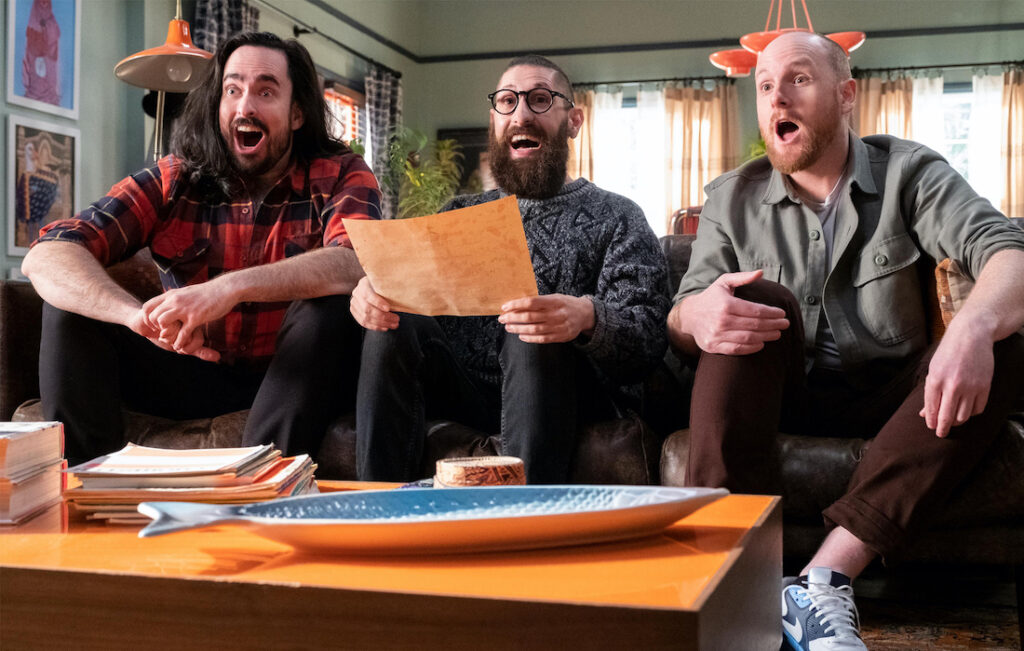When sketch comedy finds a wide audience, it’s like lightning in a bottle. Think of how The Lonely Island used to dominate “Saturday Night Live” with their digital shorts, or how Tim Robinson made a cult Netflix hit out of his 2019 series, “I Think You Should Leave.” Netflix seeks to replicate some of Robinson’s meme-able success with its extremely funny new sketch show “Aunty Donna’s Big Ol’ House of Fun,” starring the Aussie trio Aunty Donna (Mark Samual Bonanno, Broden Kelly, and Zachary Ruane). They’ve been making absurdist comedy for years (along with series director Max Miller), and treat the premise here of three roommates living together as a wall-breaking, dimension-diving, musical free-for-all for their immense satirical and comic energy.
Here is a show particularly befitting its year of release. The dialogue is simply an interlude for the screaming or the sociopathic faces trying to have fun with whatever is nearby (“Everything’s a drum!” the bizarre opening song goes, as they bang on everything in their candy-colored home), and no premise is as simple as it initially looks. Something unhinged is inevitably going to happen to break the very reality of the sketch; satire will collide with meta references and/or general freak outs; an existential crisis is nearby. Delivered with such forceful energy (this show is always “on”) and an incredible amount of creativity (it’s nearly always funny), “Aunty Donna’s Big Ol’ House of Fun” is the sketch series for this year, and its madness is a blissful escape from our current reality.
Each episode gets a premise from its “word of the day” (like “Treasure”) and that feels to be like a nod to “Pee-Wee’s Playhouse,” albeit from three comedians who could easily host their own off-kilter children’s show if they wanted. Working as a trio who can change their characters in an instant, they make for an encouraging bunch to follow around in plots the series only uses for some type of gravity. Satire becomes the single tether that keeps the humor just barely grounded (there’s even a bit about things that are “relatable,” as they very much are here in this show’s absurdist fashion), and the series has many recognizable jokes. If you squint extra hard, it’s still a show about simply having fun with your roommates, and that’s a mighty warming approach itself.

The series has been devised with a creative abandon like Bob Odenkirk and David Cross’ “Mr. Show,” as one sketch is built from the previous under some semblance of a story. “Aunty Donna’s Big Ol House of Fun” relishes any time it can tear open the reality of its segment, and it creates an unpredictability that feels free from the stagnation of a simple premise you might see in a four-minute sketch video. Somehow an episode about a treasure map leads to executive producer Ed Helms having an identity crisis, to a special prize from Ellen Degeneres, to traveling through a vortex, to throwing around a red ball with Abraham Lincoln in the studio backlot. In the world of “Aunty Donna,” it makes sense.
In the game of silly comedy being hit-and-miss, it’s the segments (like trailers) that made me laugh the least, even if I recognized what they were satirizing, and appreciated how it resembled Kentucky Fried Theater’s own “Kentucky Fried Movie.” But the energy of “Aunty Donna’s Big Ol’ House of Fun” is such that if one joke isn’t working for you, the sketch will soon be moving onto something else entirely different, while still riffing on its general premise (whether it’s finding a new roommate, going on a date) in a way that you can’t predict.
In the end, trying to recommend something as unabashedly silly as this feels like explaining the science of an inside joke. But I can say that it’s very much worth the time for anyone who has previous sketch comedy jokes lodged deep in their brains (such as myself with Derrick Comedy and The Lonely Island in my formative past). At the very least, it has the makings of something that I immediately wanted more of, especially to see such humor, and creativity, among such chaos.
Whole series screened for review. Now available on Netflix.












